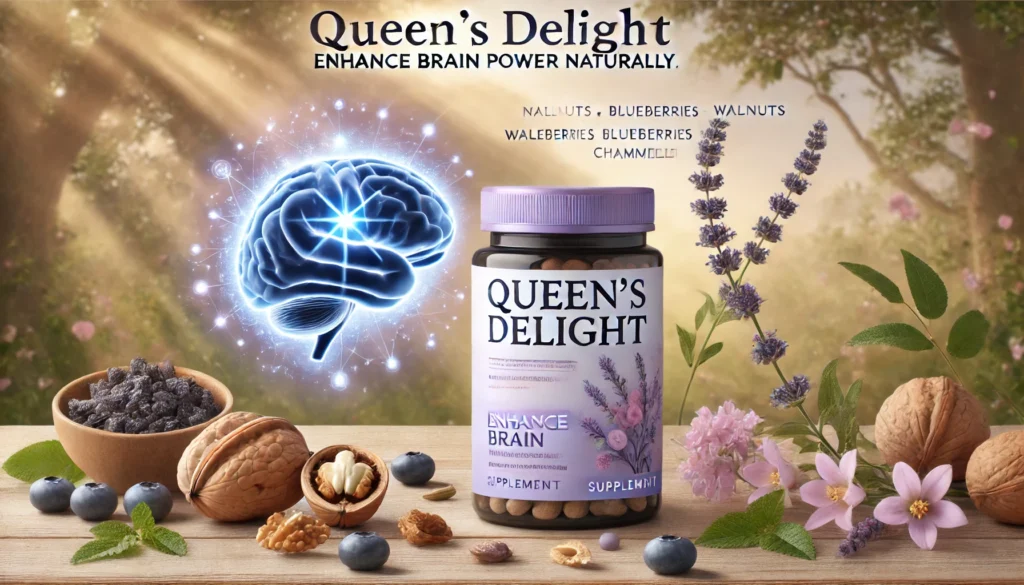Queen’s Delight, a lesser-known herbal supplement derived from a blend of natural ingredients, has gained increasing interest for its potential cognitive-enhancing properties. Its name evokes royalty, and for good reason—it has been traditionally celebrated for its broad spectrum of health benefits, including its potential as a nootropic. In this article, we will explore the composition and chemistry of Queen’s Delight, its possible mechanisms of action in the brain, its cognitive benefits, dosing guidelines, side effects, interactions with other medications or supplements, and precautions for specific health conditions.
You May Also Like:
Queen’s Delight: Potential Nootropic Benefits, Dosage, Side Effects, Interactions, and Other Important Information About This Supplement is an original (NootropicsPlanet) article.
Sources and Composition of Queen’s Delight
Queen’s Delight is an herbal supplement commonly sourced from a blend of botanicals, with key ingredients including Stillingia sylvatica (commonly known as Queen’s Delight root), royal jelly, bee pollen, and propolis. Each component contributes distinct bioactive compounds, which together provide the supplement’s nootropic potential and general health benefits.
- Stillingia Sylvatica: The primary ingredient, Stillingia sylvatica, is a perennial herb native to the southeastern United States. Traditionally used in Native American medicine, its root contains tannins, alkaloids, saponins, and flavonoids that contribute to its anti-inflammatory and immune-boosting properties.
- Royal Jelly: A secretion produced by honeybees, royal jelly is rich in vitamins, minerals, and proteins, including acetylcholine, which is a key neurotransmitter involved in memory and learning.
- Bee Pollen: Known for its dense nutritional profile, bee pollen provides a wide array of vitamins, enzymes, and antioxidants, which support cellular function and may help protect neurons from oxidative stress.
- Propolis: A resinous substance collected by bees from trees, propolis contains flavonoids and phenolic compounds that exhibit anti-inflammatory and neuroprotective effects.

Chemistry of Queen’s Delight
The bioactive compounds in Queen’s Delight interact with various biochemical pathways. Key chemical components include:
- Tannins: Found in Stillingia sylvatica, tannins act as astringent compounds that may have protective effects on neural tissues by reducing oxidative damage.
- Acetylcholine (from Royal Jelly): Acetylcholine plays a central role in cognitive function, particularly in processes related to learning and memory. Its presence in Queen’s Delight may help improve synaptic plasticity and enhance cognitive performance.
- Flavonoids (from Propolis and Bee Pollen): Flavonoids are well-known for their antioxidant activity, neutralizing free radicals and reducing oxidative stress. This is important for brain health, as oxidative damage is linked to cognitive decline and neurodegenerative conditions.
Physiological Mechanisms of Queen’s Delight in the Body and Brain
The potential nootropic effects of Queen’s Delight are primarily attributed to its ability to modulate brain activity through several mechanisms:
- Neuroprotection via Antioxidant Effects: The flavonoids and polyphenols present in propolis and bee pollen protect the brain from oxidative stress. Since the brain is highly susceptible to oxidative damage due to its high metabolic rate and oxygen consumption, these compounds help to prevent neuron degeneration and improve overall brain function.
- Acetylcholine Enhancement: Royal jelly’s acetylcholine content may help stimulate cholinergic neurotransmission, which is crucial for learning, memory consolidation, and focus. Acetylcholine is involved in enhancing synaptic plasticity, which could result in improved cognitive function.
- Anti-inflammatory Effects: Chronic inflammation in the brain is associated with cognitive decline and neurodegenerative diseases. The anti-inflammatory properties of tannins, saponins, and flavonoids in Stillingia sylvatica and propolis may help reduce inflammation in the brain, thereby supporting better cognitive health.
- Improved Cellular Energy Production: Bee pollen is rich in B-vitamins and coenzymes that contribute to cellular energy production. This can support mitochondrial function in neurons, ensuring that brain cells maintain adequate energy levels, which is vital for optimal cognitive performance.
Unlock Brain Health and Mental Resilience with Advanced Bacopa Monnieri—Shop Now on Amazon!

Potential Nootropic Benefits of Queen’s Delight
While the research on Queen’s Delight as a nootropic is still in its early stages, several potential cognitive benefits can be inferred based on its composition and known physiological actions:
- Enhanced Memory and Learning: The presence of acetylcholine in royal jelly suggests that Queen’s Delight may improve memory formation and learning capacity. Acetylcholine is integral to processes related to attention, learning, and working memory.
- Antioxidant and Neuroprotective Properties: Flavonoids and polyphenols in the supplement can protect the brain from oxidative damage. Regular consumption may reduce the risk of neurodegenerative diseases such as Alzheimer’s and Parkinson’s by mitigating the harmful effects of free radicals.
- Improved Focus and Mental Clarity: By supporting cholinergic neurotransmission and cellular energy production, Queen’s Delight may help improve mental clarity, focus, and attention span. This makes it a potentially valuable supplement for individuals experiencing brain fog or cognitive fatigue.
- Mood Enhancement: The anti-inflammatory effects of Stillingia sylvatica and propolis may have secondary benefits for mood regulation. Chronic inflammation has been linked to mood disorders such as depression, and reducing inflammation could lead to mood stabilization.

Dosage Guidelines
There is currently no standardized dosing regimen for Queen’s Delight, largely due to the variability in its composition. However, based on the dosages of its individual components, general recommendations can be made:
- General Cognitive Support: For general cognitive enhancement, doses of 500 mg to 1,000 mg of a standardized Queen’s Delight extract may be effective when taken daily. This ensures an adequate supply of the bioactive compounds without risking adverse effects.
- Memory and Focus: To specifically target memory and focus, a dose closer to 1,000 mg per day is suggested, with an emphasis on ensuring that the supplement contains a significant amount of royal jelly for its acetylcholine content.
- Anti-inflammatory and Antioxidant Support: Lower doses of around 500 mg per day may be sufficient for individuals primarily seeking the anti-inflammatory and antioxidant benefits of the supplement.
It is important to note that, as with any supplement, individual responses may vary. Therefore, starting with a lower dose and gradually increasing to the desired effect is recommended.
Side Effects of Queen’s Delight
Queen’s Delight is generally considered safe for most individuals, particularly when consumed at appropriate doses. However, there are potential side effects that users should be aware of:
- Allergic Reactions: Since Queen’s Delight contains bee-derived products like royal jelly, bee pollen, and propolis, individuals with allergies to bee products should avoid this supplement. Allergic reactions can range from mild skin irritation to more severe reactions like anaphylaxis.
- Gastrointestinal Upset: Some users may experience mild gastrointestinal issues, including nausea, diarrhea, or abdominal discomfort, particularly if taking the supplement on an empty stomach.
- Hormonal Effects: Royal jelly has been reported to influence hormone levels, particularly estrogen. As a result, individuals with hormone-sensitive conditions (e.g., breast cancer, uterine fibroids) should consult a healthcare provider before using this supplement.
- Skin Reactions: Propolis, a component of Queen’s Delight, has been associated with rare instances of contact dermatitis, particularly in individuals with sensitive skin.

Interactions with Other Supplements and Medications
Queen’s Delight contains bioactive compounds that may interact with various medications and supplements. It is essential to consider these interactions to ensure safe supplementation.
- Anticoagulant Medications: Propolis has mild blood-thinning properties. Individuals taking anticoagulants (e.g., warfarin) or antiplatelet medications should exercise caution, as Queen’s Delight may enhance the risk of bleeding.
- Cholinergic Drugs: Given the acetylcholine-boosting properties of royal jelly, combining Queen’s Delight with cholinergic drugs (e.g., donepezil) may overstimulate the cholinergic system, potentially leading to side effects such as headaches, dizziness, or nausea.
- Antihypertensive Drugs: Components in bee pollen have been shown to have vasodilatory effects, which may lower blood pressure. Individuals taking antihypertensive medications should monitor their blood pressure closely, as Queen’s Delight may enhance the effects of these drugs, leading to hypotension.
- Immunosuppressants: The immune-boosting properties of propolis and bee pollen may counteract the effects of immunosuppressive medications, such as those prescribed after organ transplantation or for autoimmune diseases.
- Nootropics: Queen’s Delight may be used in combination with other nootropic supplements such as caffeine, L-theanine, or racetams. However, users should be mindful of overstimulation or excessive cognitive enhancement, which could lead to nervousness or insomnia.
Risks for Individuals with Certain Health Conditions
While Queen’s Delight is generally safe, individuals with certain pre-existing health conditions should approach its use with caution.
- Allergies to Bee Products: As previously mentioned, individuals allergic to bee products should avoid Queen’s Delight due to the potential for serious allergic reactions.
- Hormone-Sensitive Conditions: Individuals with conditions such as breast cancer or endometriosis, which are affected by estrogen levels, should consult a healthcare provider before using the supplement due to the hormonal effects of royal jelly.
- Autoimmune Diseases: The immune-stimulating properties of bee pollen and propolis may exacerbate autoimmune conditions such as lupus or rheumatoid arthritis. Therefore, individuals with autoimmune disorders should avoid the supplement unless advised otherwise by a healthcare professional.
Conclusion
Queen’s Delight offers a unique blend of cognitive-enhancing, anti-inflammatory, and antioxidant properties, making it a potential nootropic supplement. However, like any herbal supplement, it should be used with care, particularly if combined with other medications or if underlying health conditions are present. Starting with a lower dose and consulting with a healthcare provider can help minimize the risks of side effects and interactions. Its combination of natural ingredients provides a holistic approach to cognitive health, offering a more balanced and gentle alternative to synthetic nootropics.
For those seeking to boost mental clarity, focus, and memory, this supplement may be a beneficial addition to their daily regimen. Long-term use could potentially offer sustained cognitive support, especially when coupled with a healthy lifestyle. That said, continued research and clinical studies will be essential to fully understand its efficacy and safety profile. With proper guidance and caution, Queen’s Delight holds promise as a valuable supplement for cognitive and overall health.

References:
- Queen’S Delight – Uses, Side Effects, and More. Retrieved from: https://www.webmd.com/vitamins/ai/ingredientmono-660/queens-delight
- Discover the Astonishing Benefits of Queen’s-delight. Retrieved from: https://www.picturethisai.com/benefits/Stillingia_sylvatica.html
- The Potential of Flavonoids for the Treatment of Neurodegenerative Diseases. Retrieved from: https://pmc.ncbi.nlm.nih.gov/articles/PMC6627573/
Important Note: The information contained in this article is for general informational purposes only, and should not be construed as health or medical advice, nor is it intended to diagnose, prevent, treat, or cure any disease or health condition. Before embarking on any diet, fitness regimen, or program of nutritional supplementation, it is advisable to consult your healthcare professional in order to determine its safety and probable efficacy in terms of your individual state of health.
Regarding Nutritional Supplements Or Other Non-Prescription Health Products: If any nutritional supplements or other non-prescription health products are mentioned in the foregoing article, any claims or statements made about them have not been evaluated by the U.S. Food and Drug Administration, and such nutritional supplements or other health products are not intended to diagnose, treat, cure, or prevent any disease.


